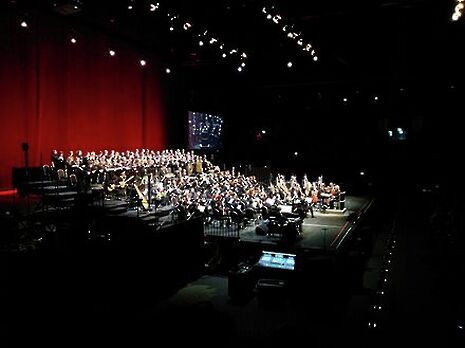Czech National Symphony Orchestra, at the Corn Exhange
An exquisite yet accessible classical performance left left Emer O’Hanlon wowed

Now fully in swing, the Cambridge Corn Exchange is playing host this year to the 30th Anniversary Season of the Classical Concert Series. The first major concert in this series took place last Tuesday evening with the Czech National Symphonic Orchestra.
The Czech National Symphonic Orchestra (established in 1993 by trumpet player Jan Hasenöhrl) is one of Europe’s highest-profile symphonic orchestras. Besides their popular summer Prague Proms Festival, the orchestra has also worked with Ennio Morricone, an endeavour which culminated in recording the soundtrack of Quentin Tarantino’s The Hateful Eight, for which Morricone gained his first Oscar after 500 television and cinema credits. In the program, the orchestra states its desire to present “a broad program ranging from classical music concerts through contemporary genre, film scores, jazz, or musicals”.
Despite this, however, the program of events on Tuesday night was (mostly) classical. Beginning with Schubert’s unfinished Symphony No.8, the first half was brought to a close with Shostakovich’s Cello Concerto No.1 in E flat, with Dvořák’s Symphony No. 8 taking up the second half.
“Despite its eerily tranquil middle section, the Cello Concerto No.1 is a dizzying, unrelenting, frantic piece”
The Dvořák was an interesting choice, not least because it is a piece full of Czech melodies and nods. However, it was the Shostakovich that made the evening electrifying and exciting. It quickly became clear why Libor Pešek (the orchestra’s regular conductor) decided not to conduct the first half on “medical advice”. Despite its eerily tranquil middle section, the Cello Concerto No.1 is a dizzying, unrelenting, frantic piece, which at times had the replacement conductor Heiko Mathias Förster nearly leaping off the podium in his frenzied management of the work. No words can do enough justice to the cellist, Natalie Clein, on whose shoulders the power of this concerto (generally considered one of the most difficult pieces for a cellist to perform) lay, and who delivered its feverish disjointed passages without once appearing to lose control.
In an interview with Cambridge News, Clein spoke about the surge of interest in classical music over recent years, attributing it to the fact that, “questions about how to make concerts ‘exciting’ are yielding interesting and successful results”. It’s this dialogue with the audience that makes classical music so invigorating to see live.
Classical music performers seem very eager to engage with their audience and make the music accessible and enjoyable. The program, for example, gave detailed notes on each pieces, not just detailing the history of its composition (which is normal), but attempting to explain the music to those about to hear it. The result was that even I found myself able to move beyond appreciation and to understand what I was listening to, even though, admittedly, my ear is neither talented nor educated enough to do this naturally.
However, I particularly noticed this engagement with the audience in the two pieces of music played after the applause at the end of each half. Though neither was mentioned in the program, the first (introduced by Clein and described as a peaceful melody to counteract current political uncertainty) was a Catalan folk-tune, quiet and haunting; the other, a jazzy tango featuring the orchestra’s founder, trumpet-player Hasenöhrl, prominently. From these, perhaps even more so than in the main pieces, you could feel the passion of the musicians for their music, not to mention the sheer amount of fun they seemed to get from playing.
The Cambridge Classical Concert Series continues periodically throughout the year, the next performance being the Zurich Chamber Orchestra on Saturday 3rd December. However, classical music in Cambridge is not difficult to find, between lunchtime concerts at West Road, the Britten Sinfonia Lunch series, Peterhouse’s Camerata Musica series, and the Fitwilliam’s Sunday afternoon recitals.
Classical music in Cambridge is a whole world that I’m only just discovering, but I’m eager to consume as much of it as I can. Tuesday evening with the Czech National Symphonic Orchestra has left me eager to hear more
 News / Night Climbers call for Cambridge to cut ties with Israel in new stunt15 April 2024
News / Night Climbers call for Cambridge to cut ties with Israel in new stunt15 April 2024 News / Police to stop searching for stolen Fitzwilliam jade17 April 2024
News / Police to stop searching for stolen Fitzwilliam jade17 April 2024 News / Cambridge University cancer hospital opposed by environmental agency12 April 2024
News / Cambridge University cancer hospital opposed by environmental agency12 April 2024 Interviews / In conversation with Dorothy Byrne1 March 2024
Interviews / In conversation with Dorothy Byrne1 March 2024 Interviews / ‘It fills you with a sense of awe’: the year abroad experience17 April 2024
Interviews / ‘It fills you with a sense of awe’: the year abroad experience17 April 2024


